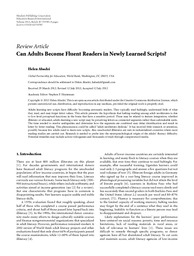
ATTENTION: The works hosted here are being migrated to a new repository that will consolidate resources, improve discoverability, and better show UTA's research impact on the global community. We will update authors as the migration progresses. Please see MavMatrix for more information.
Show simple item record
| dc.contributor.author | Abadzi, Helen | |
| dc.contributor.editor | Heyneman, Stephen P. | en_US |
| dc.date.accessioned | 2014-07-03T20:54:26Z | |
| dc.date.available | 2014-07-03T20:54:26Z | |
| dc.date.issued | 2012 | |
| dc.identifier.citation | Published in the Education Research International, V. 2012 (Article ID 710785)1-8, 2012. | en_US |
| dc.identifier.uri | http://hdl.handle.net/10106/24340 | |
| dc.description.abstract | Adults learning new scripts have difficulty becoming automatic readers. They typically read haltingly, understand little of what they read, and may forget letter values. This article presents the hypothesis that halting reading among adult neoliterates is due to low-level perceptual functions in the brain that have a sensitive period. These may be related to feature integration; whether illiterate or educated, adults learning a new script may be perceiving letters as connected segments rather than unbreakable units. The time needed to resolve ambiguities and determine how the segments are combined may delay identification and result in letter-by-letter reading. This phenomenon could be called “adult neoliterate dyslexia.” It has received little research or attention, possibly because few adults need to learn new scripts. Also unschooled illiterates are rare in industrialized countries where most reading studies are carried out. Research is needed to probe into the neuropsychological origin of the adults’ fluency difficulty. Potential remedies may include action videogames and thousands of trials through computerized media. | en_US |
| dc.language.iso | en_US | en_US |
| dc.publisher | Hindawi Publishing Corporation | en_US |
| dc.rights | Copyright © 2012 Helen Abadzi. This is an open access article distributed under the Creative Commons Attribution License, which permits unrestricted use, distribution, and reproduction in any medium, provided the original work is properly cited. | en_US |
| dc.subject | Adult literacy | en_US |
| dc.subject | Adult neoliterate dyslexia | en_US |
| dc.subject | Adult neoliterates | en_US |
| dc.title | Can adults become fluent in newly learned scripts? | en_US |
| dc.type | Article | en_US |
| dc.publisher.department | Department of Curriculum and Instruction, The University of Texas at Arlington | en_US |
| dc.identifier.doi | http://dx.doi.org/10.1155/2012/710785 | |
Files in this item
- Name:
- can adults become fluent.pdf
- Size:
- 967.7Kb
- Format:
- PDF
- Description:
- PDF
This item appears in the following Collection(s)
Show simple item record


